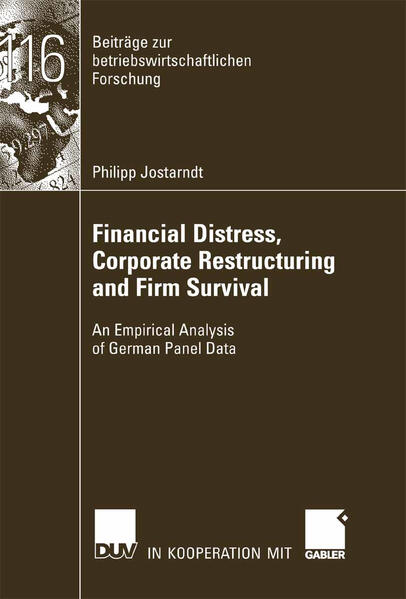
Zustellung: Di, 17.06. - Do, 19.06.
Versand in 4 Tagen
VersandkostenfreiBestellen & in Filiale abholen:
Research on corporate distress and bankruptcy and the accompanying e? orts of ? rms to restructure their operations and balance sheets have become an increasingly important ? eld in ? nancial economics and business administration. Especially in Germany where the recent period of economic downturn and large-scale bankruptcy ? lings coincided with extensivereformsofthebankruptcylegislationthetopichasenjoyedcontroversialdebates among economists, legal scholars and public policy makers. Yet so far insights from empirical research that can provide valuable guidance in these debateshaveremainedsparseandinconclusive. Onereasonforthelackofevidenceisthat common ? nancial theory on corporate restructuring is not fully compatible with the G- man institutional background and thus often allows only ambiguous predictions. Mo- over, empiricalinvestigationsofGermanrestructuringshavesofarbeenalmostimpossible due to the lack of exhaustive data. This holds in particular for private reorganizations, which present the predominant form of restructuring distressed ? rms in Germany. Many economically highly interesting aspects pertain to this ? nal stage in the corporate li- cycle. Forexample, thequestionwhetherthe? rm'smanagement, shareholdersorcreditors should trigger a formal bankruptcy proceeding or, alternatively, pursue a going-concern in an out-of-court workout has a myriad of economic implications.
Inhaltsverzeichnis
Data selection and sample descriptives. - Financial distress, corporate control, and management turnover: A German panel analysis. - Of bail-outs and bankruptcies: An empirical study of distressed debt restructurings in Germany. - Claimholder conflicts in distressed equity offerings: Evidence from German restructurings. - A study of firm exit and survival in financial distress.
Produktdetails
Erscheinungsdatum
22. Februar 2007
Sprache
englisch
Auflage
2007
Seitenanzahl
220
Autor/Autorin
Philipp Jostarndt
Vorwort
Prof. Dr. Bernd Rudolph
Verlag/Hersteller
Produktart
kartoniert
Abbildungen
XVII, 201 p.
Gewicht
326 g
Größe (L/B/H)
210/148/14 mm
ISBN
9783835005907
Entdecken Sie mehr
Bewertungen
0 Bewertungen
Es wurden noch keine Bewertungen abgegeben. Schreiben Sie die erste Bewertung zu "Financial Distress, Corporate Restructuring and Firm Survival" und helfen Sie damit anderen bei der Kaufentscheidung.










